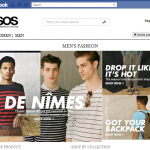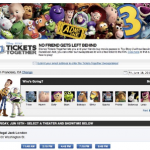March 28, 2011
Social ecommerce is a term you will be hearing a lot. It is at the forefront of marketers’ discussions and looks set to redefine ecommerce. In August 2010 Mark Zuckerberg stated that “If I had to guess, social commerce is the next area to blow up”. Since then social ecommerce (or Facebook commerce or F-commerce, if you prefer) has moved on apace. You can now rent films, book plane tickets, make donations to charities purchase clothes and even buy Tomato Sauce – all through branded Facebook Store tabs.
The rise of Facebook ecommerce has transformed Facebook Pages, allowing brands to not only engage with fans but also sell to them. Businesses are starting to realise the value of using Facebook not just to engage but to translate the conversations they are having with fans on Facebook into conversions.
Facebook now provides a tangible difference to a business’ bottom line. This is obviously a very enticing opportunity for marketers. There are more than 30 million people on Facebook in the UK alone (out of a global potential of 600 million). Social ecommerce means that brands can provide a one-stop-shop where consumers can get everything they need without ever leaving Facebook. This is a huge opportunity to convert Fans into customers.
However, how do you leverage your Facebook store to maximise profits and brand engagement?
- Holistic social ecommerce solution
Brands need to understand that social media is about trust and relevance. There are a number of key elements that must feature in any social media community – and your social ecommerce programme must utilise these. This includes ease of use, brand trust and personalised offers, coupled with high levels of customer support and advice. Creating such a holistic solution ensures your social ecommerce activity fits seamlessly into your social media offering.
Retailers must focus on keeping brand advocate experiences social and engaging – adding value to your customers’ brand experience at every stage of the buying process – instead of solely focusing on sales. It is through providing this complete brand experience that you will maximise sales.
- Social ecommerce and sharing
Social media has reinvigorated word of mouth marketing – and likewise social ecommerce encourages a personalised shopping experience, based on sharing and the trusted opinions of peers.
The very nature of social media means that brands are dealing with consumers to whom discussing and sharing things with their friends is second nature. Brands must therefore use Facebook share, ‘Like’ and review APIs to maximise the visibility of their brand, their products and their Facebook store tab.
Brands need to provide shareable, relevant content. Get this right and you have an audience who are willing to recommend you to their peer group. Facebook store apps make this easy – they include many social features which means shoppers can easily share products they Like with their Facebook friends as well. This produces a social domino effect, with your brand featured on more and more users’ news feeds – and it will optimise your online visibility and sales.
- Facebook ‘Like’ to Facebook ‘Buy’
For marketers and brands alike social ecommerce offers so many possibilities because it provides a concrete link between ‘Likes’ and a business’ bottom line.
Facebook has developed a range of tools that allows brands to track this. Facebook Insights allows you to track the performance of your e-commerce platform – this includes metrics for specific features such as ‘Likes’ and shares as well as demographic information and user behaviour. The information can then be used to understand what messages, deals and rewards will be most effective in gaining customers and maximising sales.
This ability to understand your audience and tailor how and when you communicate with them is what makes social ecommerce such a compelling solution for brands.
The future for social commerce
Facebook’s ecommerce solution has created a huge potential marketplace – and explains why it such a hot topic. However, it is also here to stay. Facebook audiences are receptive to brand messages, willing to share information and buy products from brands. A Facebook ecommerce tab is a cost effective, tangible and unique way for brands to provide a complete user experience in a social space.
It’s crucial for brands to understand exactly how they can convert ‘Likes’ into buys and, most importantly, how they can make their ecommerce platform a fully integrated part of their wider social media strategy. It is only through this process that brands will not only maximise sales but also encourage brand loyalty.





Comments